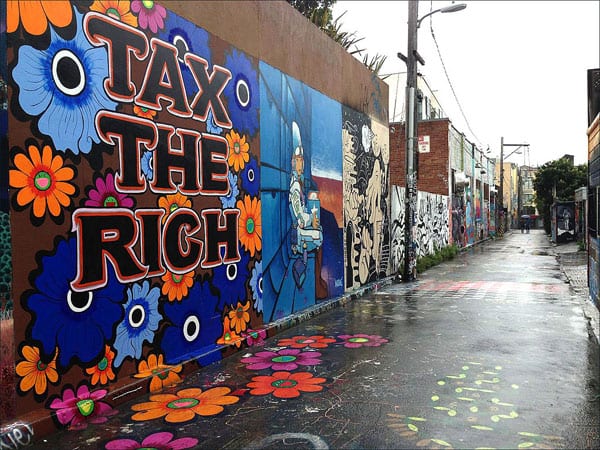
October 31, 2018; New Yorker
If the Bay Area were a country, it would be ranked ninth in the world for its billionaire population,” writes Anand Giridharadas in the New Yorker. Giridharadas gets that figure from the World Billionaire Census, which counts 74 billionaires in the San Francisco metro area out of a total of 2,754 billionaires worldwide.
San Francisco has the world’s third-highest concentration of billionaires, trailing only New York (103 billionaires) and Hong Kong (93 billionaires). Yet even so, the city of 884,000 also has an estimated 7,499 homeless people. That’s 13 percent lower than 2004, but still disturbingly high.
The juxtaposition of wealth and poverty in San Francisco is hardly new. Author Rebecca Solnit chronicled the transformation of San Francisco from a place that was once a working-class community to tech-fueled gentrification in a book titled Hollow City, published in 2000. “The city forgets what it has evicted; the new landscape erases the past,” astutely observed Tess Taylor in her San Francisco Chronicle review.
There have been some successes in preserving affordability, such as those of a nonprofit community development corporation that has used community organizing and property management to maintain thousands of units of affordable housing in Chinatown, or even the creation of a multi-use building that contains both a library and 140 units of housing for low-income seniors. But despite plentiful resources, making San Francisco livable for those at the bottom end of the income scale is a challenge most often not met.
Proposition C, which NPQ first wrote about two months ago, will be on city ballots on Tuesday. The measure, if passed, will nearly double San Francisco’s budget for addressing housing and homelessness, raising an estimated $300 million a year by taxing business gross receipts (for most companies, the rate would be half a percent of gross receipts above $50 million).
Sign up for our free newsletters
Subscribe to NPQ's newsletters to have our top stories delivered directly to your inbox.
By signing up, you agree to our privacy policy and terms of use, and to receive messages from NPQ and our partners.
Businesses that would pay the tax include Salesforce, Yelp, the Gap, Williams Sonoma, Pacific Gas and Electric, Wells Fargo, and Charles Schwab. The revenues raised are slated to support 4,000 units of subsidized housing, public health supports for street-based care of those with mental illness, temporary subsidies to keep people in their homes, and 1,075 new shelter beds.
The measure, developed by the Coalition on Homelessness, a community organization with a 30-year history, has the support of a broad spectrum of community groups. Jennifer Friedenbach, the coalition’s executive director, is cautious about expectations: “We’re not claiming to end homelessness with this. We were really careful to put together a plan that was doable.”
But things got weird when Salesforce’s CEO not only endorsed the initiative, but got into a tête-à-tête with Twitter’s CEO, as NPQ’s Martin Levine covered last month. Giridharadas, author of Winners Take All and a recent interviewee on an NPQ “Tiny Spark” podcast, has now also weighed in, calling out the irony that, “In a time of extreme inequality…[Salesforce co-CEO Marc] Benioff and [Twitter CEO] Dorsey, two white-guy billionaires [are] arguing over how best to help their city’s poor and vulnerable.” As Giridharadas points out, nobody’s motives are pure. What is clear, however, is that power has shifted from the people to the plutocrats.
Meanwhile, the present scene in San Francisco borders on the bizarre. London Breed, the city’s first Black female mayor, ran pledging to address homelessness, but opposed the initiative because, she said, “the flight of companies and jobs from the city” is “inevitable” if the tax levy passes. But Salesforce, the city’s largest private sector employer with 8,400 employees, has not only endorsed the “job killing” measure, but has contributed $5.9 million to the “Yes” campaign, with $2 million more coming personally from Benioff. Presumably those Salesforce jobs are staying. Meanwhile, other business leaders, like Dorsey, say they too support addressing homelessness, but want to follow the mayor’s lead. Alice in Wonderland never had it so hard.
Regardless, if the measure passes, effective implementation, both by community partners and the city leadership, will be key. In her statement on homelessness written this past March, Breed wrote that, “In confronting homelessness, our biggest obstacle is the perception that the crisis can’t be solved, that homelessness and suffering on our streets are an inevitable part of city life. They are not.… I hope to prove that.” Proposition C might not have been Breed’s preferred vehicle, but if it passes, it may well give her the opportunity to act that she was seeking.—Steve Dubb













